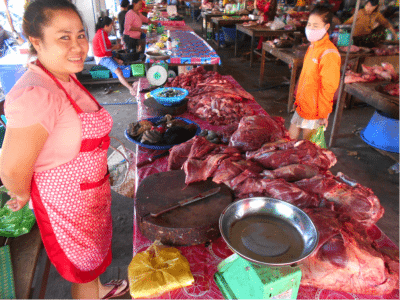
Beef and buffalo meat selling at a wet market in Laos. The beef (and buffalo) section at the Pakse wet market, southern Laos.
Indian buffalo meat could start legally flowing into Indonesia before the festival of Idul Fitri or Lebaran on July 6 and 7, following the formal release by Indonesia of import permits to Indian export abattoirs.
A copy of an import permit seen by Beef Central, which is signed by Indonesia’s director of livestock and animal health Muladno Bashar and dated June 8, 2016, lists 10 abattoirs that have been granted approval to export frozen boneless buffalo meat to the Republic of Indonesia.
The 10 approved abattoirs are from the regions of Telegana, Uttar Pradesh, Maharashtra and Punjub. The permit requires the imported beef to be deboned and deglanded.
The Indonesian Government recently introduced new regulations to allow the import of livestock and/or livestock products from zones, not countries, free of foot-and-mouth disease (FMD).
That change facilitated the import of bovine meats from India, where foot and mouth disease is present.
The Indonesian Government has stated that meat from India is needed to increase the supply of bovine meat and lower the cost for Indonesian consumers.
The country is currently marking month-long Ramadan festivities which is the peak annual period of demand for beef. A shortage of supply relative to the strong demand has seen prices in some wet markets shoot as high to IDR 150,000/kg, a significant stretch for the budgets of many Indonesian households.
Indonesian Government ministers have also often spoken of their desire to reduce Indonesia’s heavy dependence on meat from Australia, which supplies all of the country’s live cattle imports and about half of its imported beef.
The Agriculture Ministry’s farming and animal health director general Muladno Bashar recently confirmed that a team of auditors had been sent to inspect several export abattoirs in India.
The release of the permit on June 8 now opens the door for potentially significant volumes of Indian buffalo meat to flow into the Indonesian market.
Some illegally imported buffalo meat from India has been reported in the market in recent years, but not in particularly significant volumes.
FMD issues
The decision to import beef from a country where Foot and Mouth Disease is present increases the risk of exposing Indonesia’s cattle herd to the disease, and also represents an increased risk of transmission to Australia’s export dependent cattle industry.
Australia helped to fund the eradication of Foot and Mouth Disease in Indonesia in the 1960s and 1970s.
FMD is a highly contagious viral disease of livestock which can cause serious production losses and high mortality rates in young animals. Many export markets ban access to beef and cattle from FMD affected countries.
The virus can be introduced via the import of frozen beef. It can survive for long periods in fresh and partly cooked meat and dairy products.
A previous attempt in 2009 by the Indonesian government to change the law to allow beef and cattle imports from India and Brazil was vocally opposed by Indonesian farmers and was ultimately overturned by Indonesia’s High Court, on the grounds that it did not comply with the Indonesian constitution.
Russia last year allowed the importation of frozen buffalo meat from India, following a long inspection period, but within a few months had imposed a ban on several Indian abattoirs after the FMD virus was detected in an imported consignment of Indian buffalo meat.
It is not known yet at what price the legally-imported Indian buffalo meat will sell for in Indonesia or whether the meat will be allowed to be sold through wet markets, which are traditionally used to sell fresh, locally slaughtered beef.
India is one of the world’s largest exporters of bovine meat. Indian law prohibits the export of meat from cows, oxen and calves but allows the export of buffalo meat.

Frightening decision, increased risk of disease contamination of cattle and change in demand patterns for beef in Indonesia as Indian buffalo/beef does make excellent bakso meat balls at low cost. This will affect the demand for Ongole and Bali Indonesian cattle which supply the ingredients of the very popular bakso meat ball which is the secret as to how Indonesians can afford traditional beef production and Aussie imports. If Indian buffalo/beef enters the market what is there to stop imports of Brazilian beef? Imports of Indian buffalo will severely disrupt the Indonesian cattle industry including cattle breeding, cattle feedlotting and slaughter and imports from Australia. John Griffith